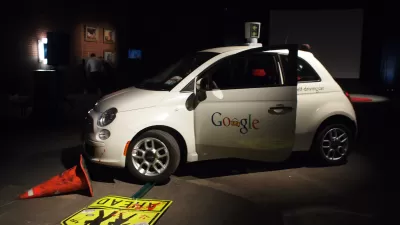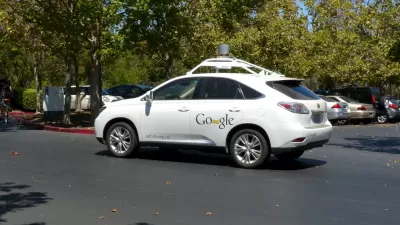Breaking news came in a pair this week for Google's self-driving car technology.

First, via Mike Murphy for Quartz, came the news that Google was awarded a patent that could enable self-driving delivery trucks. Murphy details the patent:
Google’s patent outlines what it calls an 'autonomous delivery platform' for delivery trucks. The trucks would be fitted with a series of lockers that could potentially be unlocked with a PIN code sent to the person waiting for the delivery before the truck arrives at their location. The patent also suggests the locker could be unlocked by a customer’s credit card, or an NFC reader. After the package is dropped off, the truck will continue on to its next delivery point, or return to the depot to pick up more packages.
Murphy provides more on what the patent means, and how self-driving delivery trucks could fit into the futuristic retail delivery business, along with Amazon's famous drone fleet.
Second, via Kristen Korosec for Fortune, came the news that Google had cleared a major roadblock toward commercializing self-driving cars. Specifically, writes Korosec, "The National Highway Transportation and Safety Administration told Google that the artificial intelligence system that controls its self-driving car can be considered a driver under federal law."
The article also includes the next steps in what Korosec says will be a long regulatory process before self-driving cars will be street legal for public use.
FULL STORY: Google wants to deliver packages from self-driving trucks

Alabama: Trump Terminates Settlements for Black Communities Harmed By Raw Sewage
Trump deemed the landmark civil rights agreement “illegal DEI and environmental justice policy.”

Study: Maui’s Plan to Convert Vacation Rentals to Long-Term Housing Could Cause Nearly $1 Billion Economic Loss
The plan would reduce visitor accommodation by 25% resulting in 1,900 jobs lost.

Why Should We Subsidize Public Transportation?
Many public transit agencies face financial stress due to rising costs, declining fare revenue, and declining subsidies. Transit advocates must provide a strong business case for increasing public transit funding.

Wind Energy on the Rise Despite Federal Policy Reversal
The Trump administration is revoking federal support for renewable energy, but demand for new projects continues unabated.

Passengers Flock to Caltrain After Electrification
The new electric trains are running faster and more reliably, leading to strong ridership growth on the Bay Area rail system.

Texas Churches Rally Behind ‘Yes in God’s Back Yard’ Legislation
Religious leaders want the state to reduce zoning regulations to streamline leasing church-owned land to housing developers.
Urban Design for Planners 1: Software Tools
This six-course series explores essential urban design concepts using open source software and equips planners with the tools they need to participate fully in the urban design process.
Planning for Universal Design
Learn the tools for implementing Universal Design in planning regulations.
Caltrans
Smith Gee Studio
Institute for Housing and Urban Development Studies (IHS)
City of Grandview
Harvard GSD Executive Education
Toledo-Lucas County Plan Commissions
Salt Lake City
NYU Wagner Graduate School of Public Service





























